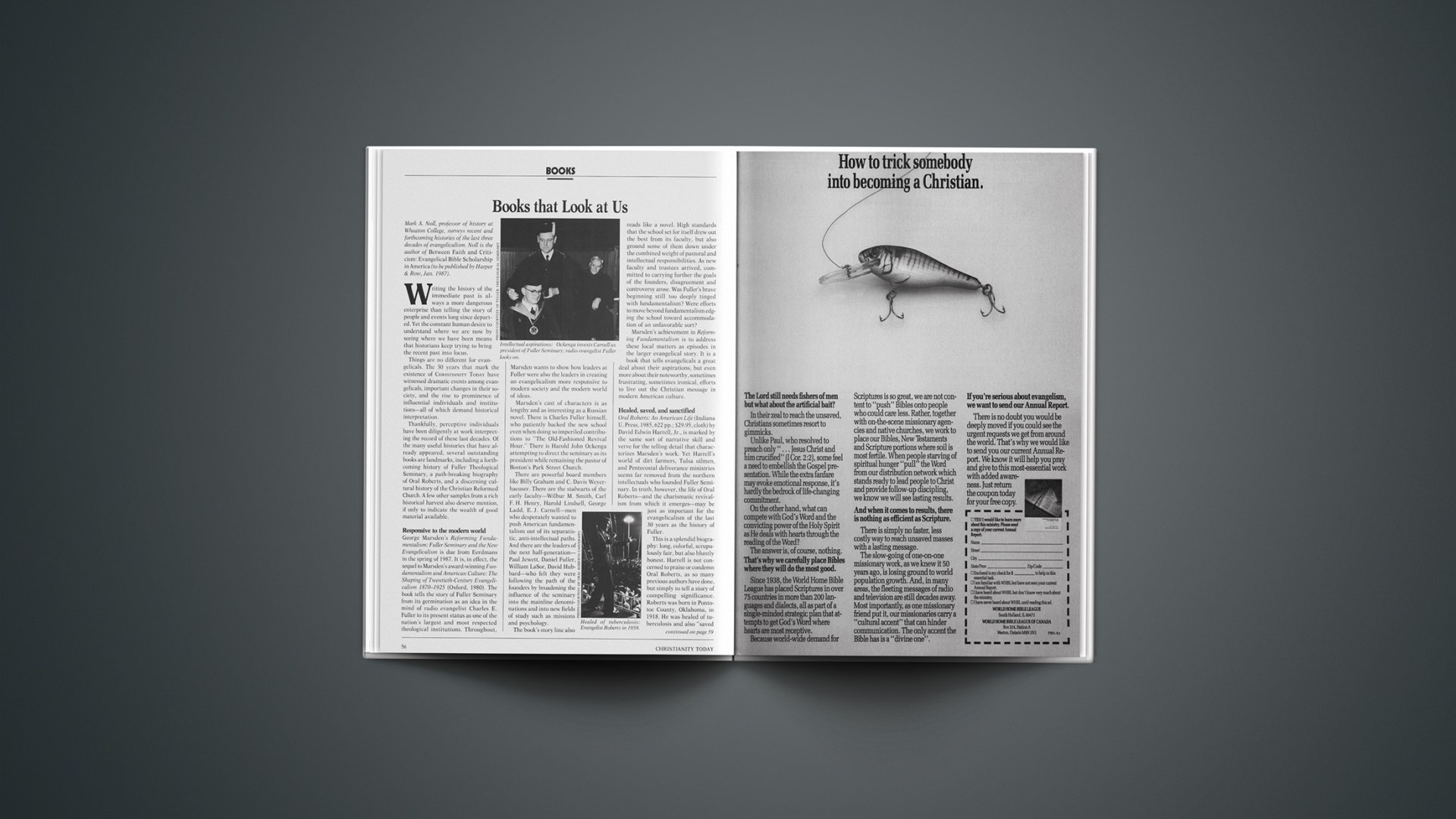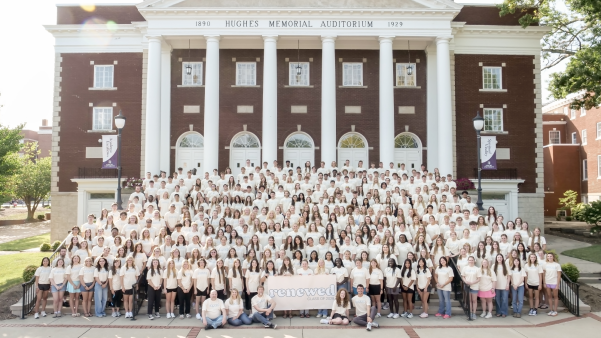Mark A. Noll, professor of history at Wheaton College, surveys recent and forthcoming histories of the last three decades of evangelicalism. Noll is the author of Between Faith and Criticism: Evangelical Bible Scholarship in America (to be published by Harper & Row, Jan. 1987).
Writing the history of the immediate past is always a more dangerous enterprise than telling the story of people and events long since departed. Yet the constant human desire to understand where we are now by seeing where we have been means that historians keep trying to bring the recent past into focus.
Things are no different for evangelicals. The 30 years that mark the existence of CHRISTIANITY TODAY have witnessed dramatic events among evangelicals, important changes in their society, and the rise to prominence of influential individuals and institutions—all of which demand historical interpretation.
Thankfully, perceptive individuals have been diligently at work interpreting the record of these last decades. Of the many useful histories that have already appeared, several outstanding books are landmarks, including a forthcoming history of Fuller Theological Seminary, a path-breaking biography of Oral Roberts, and a discerning cultural history of the Christian Reformed Church. A few other samples from a rich historical harvest also deserve mention, if only to indicate the wealth of good material available.
Responsive To The Modern World
George Marsden’s Reforming Fundamentalism: Fidler Seminary and the New Evangelicalism is due from Eerdmans in the spring of 1987. It is, in effect, the sequel to Marsden’s award-winning Fundamentalism and American Culture: The Shaping of Twentieth-Century Evangelicalism 1870–1925 (Oxford, 1980). The book tells the story of Fuller Seminary from its germination as an idea in the mind of radio evangelist Charles E. Fuller to its present status as one of the nation’s largest and most respected theological institutions. Throughout, Marsden wants to show how leaders at Fuller were also the leaders in creating an evangelicalism more responsive to modern society and the modern world of ideas.
Marsden’s cast of characters is as lengthy and as interesting as a Russian novel. There is Charles Fuller himself, who patiently backed the new school even when doing so imperiled contributions to “The Old-Fashioned Revival Hour.” There is Harold John Ockenga attempting to direct the seminary as its president while remaining the pastor of Boston’s Park Street Church.
There are powerful board members like Billy Graham and C. Davis Weyerhaeuser. There are the stalwarts of the early faculty—Wilbur M. Smith, Carl F. H. Henry, Harold Lindsell, George Ladd, E.J. Carnell—men who desperately wanted to push American fundamentalism out of its separatists, anti-intellectual paths. And there are the leaders of the next half-generation—Paul Jewett, Daniel Fuller, William LaSor, David Hubbard—who felt they were following the path of the founders by broadening the influence of the seminary into the mainline denominations and into new fields of study such as missions and psychology.
The book’s story line also reads like a novel. High standards that the school set for itself drew out the best from its faculty, but also ground some of them down under the combined weight of pastoral and intellectual responsibilities. As new faculty and trustees arrived, committed to carrying further the goals of the founders, disagreement and controversy arose. Was Fuller’s brave beginning still too deeply tinged with fundamentalism? Were efforts to move beyond fundamentalism edging the school toward accommodation of an unfavorable sort?
Marsden’s achievement in Reforming Fundamentalism is to address these local matters as episodes in the larger evangelical story. It is a book that tells evangelicals a great deal about their aspirations, but even more about their noteworthy, sometimes frustrating, sometimes ironical, efforts to live out the Christian message in modern American culture.
Healed, Saved, And Sanctified
Oral Roberts: An American Life (Indiana U. Press, 1985, 622 pp.; $29.95, cloth) by David Edwin Harrell, Jr., is marked by the same sort of narrative skill and verve for the telling detail that characterizes Marsden’s work. Yet Harrell’s world of dirt farmers, Tulsa oilmen, and Pentecostal deliverance ministries seems far removed from the northern intellectuals who founded Fuller Seminary. In truth, however, the life of Oral Roberts—and the charismatic revivalism from which it emerges—may be just as important for the evangelicalism of the last 30 years as the history of Fuller.
This is a splendid biography: long, colorful, scrupulously fair, but also bluntly honest. Harrell is not concerned to praise or condemn Oral Roberts, as so many previous authors have done, but simply to tell a story of compelling significance. Roberts was born in Pontotoc County, Oklahoma, in 1918. He was healed of tuberculosis and also “saved and sanctified” in 1935 at a tent revival under Holiness Pentecostal preachers. Almost immediately he felt a call to preach and heal.
With inexhaustible energy, Roberts spoke, wrote, traveled, prayed, and won his way into the hearts and homes of countless Americans. By 1956 his magazine, Healing Waters, had a circulation of over a million, and his radio program was carried by 400 stations. The founding of Oral Roberts University, the construction of the City of Faith hospital, Roberts’s well-publicized transfer to the United Methodist Church, his success on television, the tragedies that have overtaken members of his family—these and other sensational events are on the public record.
The most important thing about Harrell’s book is precisely that he does not regard these matters as sensations. Rather, he recognizes that they are but the most visible manifestations of a vast expansion of Pentecostalism out of its earlier sectarianism into a new public respectability. The life of Oral Roberts is a window into a form of Christian experience that non-Pentecostal believers often ignore and nonbelievers regularly ridicule. No one who reads this careful biography should ever make either of those mistakes again.
Unusually Gifted And Simply Unusual
James D. Bratt’s Dutch Calvinism in Modern America: A History of a Conservative Subculture (Eerdmans, 1984, 329 pp.; $13.95, paper) represents still another type of history. If Marsden opens up a parachurch agency and Harrell reveals an individual, Bratt offers perhaps the most sensitive depiction that is currently available of a twentieth-century denomination. Furthermore, his subject, the Christian Reformed Church (CRC), should be of great interest to other evangelicals. That body is committed to biblical authority, eager to sponsor both missionary activity and social reform, and devoted to making all of life an arena for praise to God. Yet because it is an immigrant denomination, its Dutch heritage and European ways give it unusual strengths and weaknesses different from other evangelical groups.
Bratt keeps track of an amazing range of issues, schools, journals, books, arguments, and people (including statesmen, mavericks, novelists, poets, and a long list of influential clergymen). And he does this while paying careful attention to larger social and political contexts. The CRC is a denomination rich in unusually gifted (sometimes, simply unusual) leaders; it is a denomination where theological debate sometimes leads to theological nitpicking. Its life in America has been lived under the influence of Old World traditions such as the pietism associated with nineteenth-century revivals and an intellectual legacy associated with the great theologian-politician-academician Abraham Kuyper (1837–1920). Recent CRC history concerns the selective use of the Old World inheritance in the shifting contours of the New World.
The Christian Reformed Church enjoys a close relationship with other evangelicals. As an example, the first issue of CHRISTIANITY TODAY contained an essay by G. C. Berkouwer, a Dutch theologian who sustained contact with his countrymen in America. At the same time, the Christian Reformed have continued to nurture their own set of social and intellectual habits. They were members of the National Association of Evangelicals for a while, but also have contemplated joining the World Council of Churches.
With great skill, Bratt reveals how the Christian Reformed have fared in their relations with the broader evangelical spectrum and how they have progressed in coming to terms with America. His success in telling the story of this small denomination should be an encouragement to others to reach similar heights in writing the history of their groups.
Evangelical Lives
Many other good books are now at hand to assess the last 30 years of evangelical history, including the biographies and autobiographies of important leaders.
Billy Graham, the most visible and most influential evangelical of this period, has been the subject of several books, of which the appreciative studies by John Pollock (e.g., To All Nations: The Billy Graham Story [Harper & Row, 1985]), and a quixotic volume by Marshall Frady (Billy Graham: A Parable of American Righteousness [Little, Brown, 1979]) have been most informative. But Billy Graham, and the Billy Graham phenomenon, still await definitive treatment.
If Billy Graham has been the most important public evangelical, Carl F. H. Henry has been the key figure on the evangelical intellectual front. Henry’s autobiography, Confessions of a Theologian, is just out from Word. It promises grist for the mills of all who would hope to understand Fuller Seminary’s early days, Henry’s 12 years as editor of CHRISTIANITY TODAY, and the important theological contribution of his six-volume God, Revelation, and Authority.
Impact Of Modernity
Several other informative books have drawn on the community of scholars to assess the state and impact of evangelicalism. Two of these—The Evangelicals, edited by David Wells and John Woodbridge (Abingdon, 1975; expanded edition, Baker, 1977) and Evangelicalism and Modern America, edited by George Marsden (Eerdmans, 1984)—contain especially insightful essays, some by nonevangelicals, assessing strengths and weaknesses of recent years.
Social scientists have also begun to subject evangelicals to careful scrutiny. Two good examples of such work are sociologist James Hunter’s American Evangelicalism: Conservative Religion and the Quandary of Modernity (Rutgers, 1983), a book that communicates solid historical information while locating evangelicals within modern society; and Robert Booth Fowler’s A New Engagement: Evangelical Political Thought, 1966–1976 (Eerdmans, 1982), which describes the reawakening of evangelical interest in politics and public issues.
Finally, recent books on the progress of evangelicalism in Britain provide useful points of comparison. Randle Manwaring’s From Controversy to Co-Existence: Evangelicals in the Church of England, 1914—1980 (Cambridge, 1985) points to the importance of university work for the revival of evangelical strength there. And Christopher Catherwood’s Five Evangelical Leaders (Harold Shaw, 1985) includes biographical sketches of Americans Billy Graham and Francis Schaeffer as well as Britons Martyn Lloyd-Jones, J. I. Packer, and John R. W. Stott.
If the past is prologue, historians, though they look backward, still help a community as it struggles into the future. Evangelicals enjoy a full crop of good books on their recent past. The historians who have written them clarify self-identity even as they illuminate subjects calling for more intensive scrutiny.










